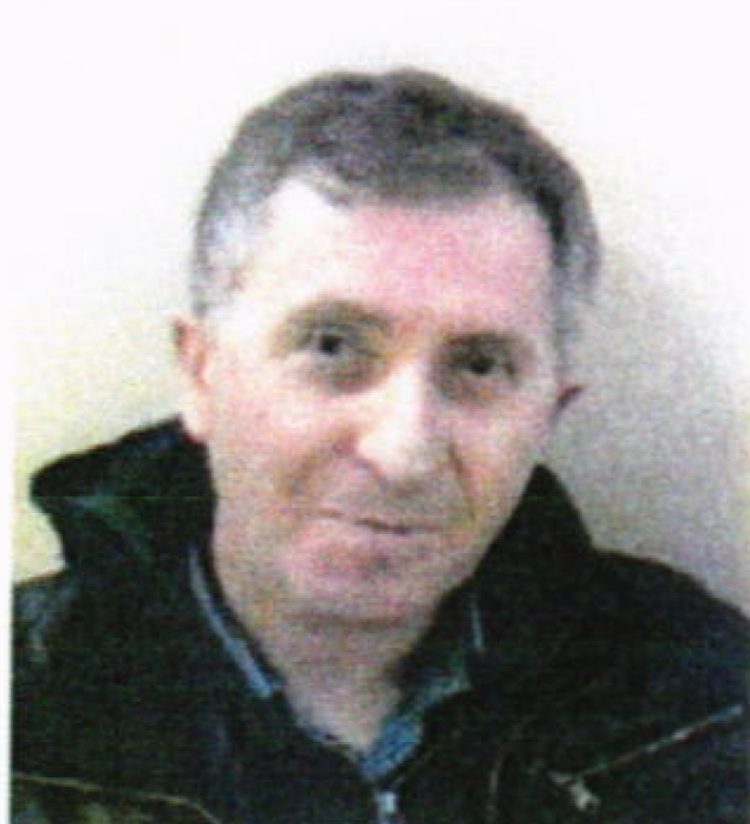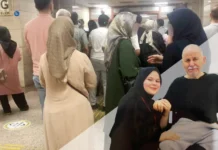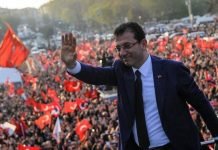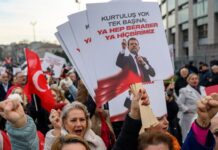Lt. Col. Tuncay Koçak, head of the organized crime unit at the Gendarmerie General Command, testified in court that he witnessed the visit of then-Interior Minister Efkan Ala to a detention center where he and other military officers were beaten, tortured and subjected to abuse, Nordic Monitor reported.
Speaking during a hearing at the Ankara 23rd High Criminal Court on August 31, 2018, Koçak provided a detailed account of the torture and abuse he suffered at the hands of the police at a detention site where hundreds of people were held incommunicado for days and weeks while they were brutally beaten, denied access to food, water and bathroom visits, and not allowed to see a lawyer or family members.
The 52-year-old Koçak witnessed Ala, the then-interior minister, whose portfolio included the police and gendarmerie, both of which function as law enforcement agencies in Turkey, visiting the site, accompanied by senior police chiefs. His visit was tantamount to an implicit approval of the torture that went on and even intensified after he left the site.
“While I and others were going through this [torture], Efkan Ala, the interior minister at the time, and his associates, who appeared to be senior police chiefs judging from their uniforms, came to the sports hall,” Koçak told the court.
Tuncay Koçak testified in court that Interior Minister Efkan Ala visited a detention center where torture was committed:
Ala is currently deputy chairman of Turkey’s ruling Justice and Development Party (AKP), which is led by President Recep Tayyip Erdoğan.
The testimony confirms that torture and abuse were approved by government leaders and explains why the government protected the perpetrators and issued a circular providing immunity to those who were involved in torture.
Months after his detention, Koçak was charged with coup plotting although there was no evidence to support the accusations that he was involved in a failed coup on July 15, 2016 that was believed to be a false flag operation plotted by President Erdoğan and his intelligence and military chiefs.
When Koçak went to his office on the morning on July 15, he was feeling a bit under the weather, yet he worked all day. When he was about to leave headquarters that evening, he was told about a terror alert issued by the General Staff based on credible intelligence. Recalling that the capital had seen back-to-back terrorist attacks in recent months, Koçak, who had spent most of his career involved in a counterterrorism campaign in Turkey’s Southeast, decided to stay. But he started to feel worse and fell asleep after taking some medication in his office. When he woke up, the building was under fire by unknown parties, prompting him to believe the terrorist attack was underway.
He and his men took security measures and stayed away from the windows that were being smashed with a hail of bullets raining down on the building from several directions. Snipers positioned on a nearby high-rise residential building were shooting indiscriminately. They hunkered down and called for help. In the morning, when they realized that it was a police special ops team that was taking shots at them, he and his men turned themselves in without any resistance and without engaging in a firefight. Yet the police abuse started right there on the entry floor of the Gendarmerie General Command building. They were declared guilty on the spot.

“We were told to take our clothes off on the way out. I was trying to take my clothes off, and all of a sudden, they [the police] came at me and started tearing my clothes off. I fell to the right with a kick to my left ear. I lost count of the blows afterwards because I was being kicked from left and right, punched, hit with rifle butts, thrown out of the building, wearing only my underwear. After lying face down on the pavement, my hands were cuffed behind my back. They continued to beat me in this position. I couldn’t breathe without pain for a year because of the kicks I took to my left ribs. I didn’t know if I had a broken or fractured tailbone but couldn’t sit for five months because of the pain there,” he said.
Then he was told to get on a bus brought by the police to take them to a detention site that was actually a sports hall converted into an unofficial torture chamber. He could barely stand from the beatings he received on the ground. When he managed to get on his feet, he fell to the ground again with the new kicks he received. When he was finally on the bus, he heard somebody behind him telling the police to kill him on the way to the site.
As the bus started moving, a man with a police vest, described as thin, 1.75 centimeters tall, curly black hair and a mustache and wearing military boots came up to him in the back of the bus and started kicking him. “With the sole of his boot, he repeatedly kicked my head, which was against the stairwell of the back door. As he was crushing my right foot, he was also hitting me on the head with a CB radio in his hand. It took three months for the bruises on my toes to go away and another three months for the numbness I felt to disappear,” he said.
Lt. Col.Tuncay Koçak’s testimony on torture:
The brutal beating on the bus continued during the trip. At times the same policeman slammed his head on the iron grip bars. The bus stopped halfway through the detention site during which time the police allowed a mob, apparently organized in advance, to throw rocks and heavy objects at the bus, smashing windows and injuring many detainees who could not protect themselves due to the handcuffs. A civilian with a beard broke the rear window of the bus and started hitting Koçak with an iron bar while the police simply looked on. After the objects thrown at the bus started to risk injury to the police, the bus moved on.
When they finally arrived at Ankara police headquarters, a welcome party was awaiting them. Police officers, male and female, some in civilian clothes, formed a corridor leading to a sports hall, ready with batons and sticks to beat, punch and kick them as they were moved inside. When his turn came, Koçak fell from a kick and found himself in a mud pit that was specially created right at the entry. He got up and fell immediately again with another blow. They had to drag him out of there, and he was put inside the building.

He joined hundreds of military men, most in their underwear, forced to kneel with heads on the floor, handcuffed behind their backs. None of them were officially charged, not even duly processed in the criminal justice system and all were active duty military officers as well as privates who require a completely different set of detention procedures. But nobody seemed bother with due process.
The hall was a makeshift torture site, away from public view, and the detainees were tortured to accept already prepared statements to support the government storyline on the failed coup. Forcing detainees to remain in a stress position was one of the many torture tactics police used at the site. For the first two days, no food or water was provided. Later a small portion of food and water was handed out to be shared by many. The food the police gave them turned out to be spoiled, causing mass diarrhea.
“With our heads down on the floor, police would take off their belts and hit our backs with them as well as brush handles and plastic and metal handcuffs,” Koçak said. They were denied bathroom visits for long hours, forced to wait in queues to go to the toilet, and the police did not even remove the handcuffs when they were using the bathroom. The police used every opportunity to turn the detainees’ lives into a living hell.
Koçak said he was shocked to hear a police officer threatening a major with the rape of his unborn baby girl and saying that his wife and children were the spoils of a jihadist war and that he could do whatever he wanted with them.
Testimony reveals that the torture included sodomizing the victim:
“While I was waiting in line to go to the bathroom, an officer in a police vest with a beard and a gun in his waistband came up to me and said: ‘Look at me, what’s your rank?’ I said ‘Colonel.’ He said, ‘Son of a bitch, don’t look at me.’ Then he punched me and started hitting the back of my neck with the base of a CB radio,” he said.
Koçak had difficulty describing in full the details of the most traumatic experience he went through while in detention, but it was enough to portray the grim picture of sodomy that was inflicted on other detainees as well. “Suddenly, I woke up to a voice that was screaming, ‘Don’t be so tight and stiff, you son of a bitch, I’m an expert in such things, bend over, I’ve done this many times.’ I won’t go into the details, Your Honor,” he told the court.
He did not remember when he was taken to a doctor for a medical examination but recalled the doctor’s advice that he should see brain and eye surgeons. But the police never bothered to take him to a hospital for treatment. The medical examination reports issued while he was in detention corroborated his accounts without elaborating on the details. Dr. Petek İpek Kişioğlu described in an undated report marks of torture on his body but wrote that he needed to see a brain surgeon for further examination, a contradiction in itself because he never explained why the victim needed to see the surgeon. It was clear that the doctor noticed the impact of trauma on his head from the beatings, as Koçak explained in his testimony. Under police pressure, Kişioğlu also noted that there was no urgency for the medical treatment.
Medical reports issued for Lt. Col. Tuncay Koçak:
Another doctor, İbrahim Karadağ, saw no life-threatening condition in a report issued on July 17, 2016. He reported several injuries on his body. His colleague issued a similar report the next day. The one written on July 19 by Dr. Ahmet Keskin simply recorded the numbness the patient felt in his feet. A medical report issued on July 20 stated that there were no new marks of torture or beating, as the doctor who wrote the report, Coşkun Marşap, declined to record what he saw.
The reports appeared to have been prepared in haste, with many fields empty and done simply to fulfill the requirement for paperwork. Some contradicted each other. Many detainees testified in court that the doctors who were brought to the sports hall were intimidated by the police into not reporting torture and abuse.
After he went to prison Koçak repeatedly filed requests to see a doctor and visit a hospital for medical treatment, but he was told the wounds would heal on their own. On February 26, 2018, 17 months later, Koçak had the first opportunity to visit a hospital for his complaints.
Torturers in Turkey were protected by a government decree issued by President Erdoğan that provided blanket immunity for officials who were involved in coup investigations. Decree-law No. 667, issued by the government on July 23, 2016, granted sweeping protection for law enforcement officers in order to prevent victims from pressing complaints of torture, ill treatment or abuse against officials. There were multiple cases in which Turkish prosecutors refused to investigate torture allegations, citing this decree-law, or KHK (Kanun Hükmünde Kararname).
Article 9 of this KHK stated that “legal, administrative, financial and criminal liabilities shall not arise in respect of the persons who have adopted decisions and fulfill their duties within the scope of this decree-law.” The decree was criticized by human rights organizations for being a clear violation of articles of the International Covenant on Civil and Political Rights (ICCPR) as well as the European Convention on Human Rights, to which Turkey is a party, yet it was never annulled. In fact, the Turkish parliament passed the decree into law on October 18, 2016.
As of today, no prosecution has been initiated against people who tortured detainees at unofficial sites despite multiple complaints filed by the victims and their lawyers.
The abuse continued in the prison where he was shipped to after a quick arraignment hearing during which he had no opportunity to consult with a bar-appointed lawyer. In a jam-packed cell, he had to share limited food and water with other inmates. His requests for medical treatment were ignored most of the time. The government restricted family visits and phone calls and sent him to a prison in Kocaeli, far from Ankara where his family lived and his trial was conducted.
At the end of sham trials in June 2020, he was declared guilty and sentenced to serve nine aggravated life sentences.



















